The twelfth session of the eighty-fourth round of Congress 60’s educational workshops, dedicated to travelers and companions, started under the mastership and guardianship of Mr. Hossein Dezhakam, with traveler Jafar serving as the secretary, on Wednesday, April 30, 2025, at 10 a.m., with the agenda: “The First and Second Pamphlets of Worldview”
I hope everyone is doing well. I've said multiple times that when you address me, just write and say “مهندس “ meaning Mr. Hossein Dezhakam in Persian—no need to add my name, Hossein Dezhakam.”
Hello, friends. I am Hossein, a traveler. I am doing well, and God willing, may you all be well too.
Today is the April 30, 2025. We see how quickly Nowruz has passed, and now it’s already the 10th of Ordibehesht (April 30). Summer is upon us, and we are thinking about air conditioners for summer—time to turn them on!
“If life is pleasant, even Noah’s lifespan feels short; if life is difficult, even half a breath is too much.” [a poem by Iranian Shirazi Poet, Raziadin Artimani]
Today's meeting topic is “Worldview 1 & 2,” and the instructor and guardian is Amin [because the worldview pamphlets have been written by him]. I just have a few administrative matters to address before we proceed.
On Saturday, I attended a session discussing issues raised in the Family Group Assistants’ Council on Saturday, the sixth of Ordibehesht, [April, 26]. These meetings happen every Saturday. I attended the session with the female companions, and here are the approvals: It was a great decision to hold meetings for companions, appointing 15 to 16 assistants to discuss each branch's strengths and weaknesses, relationships, and decision-making. The Assistants' Council meeting was held in the Phoenix building.
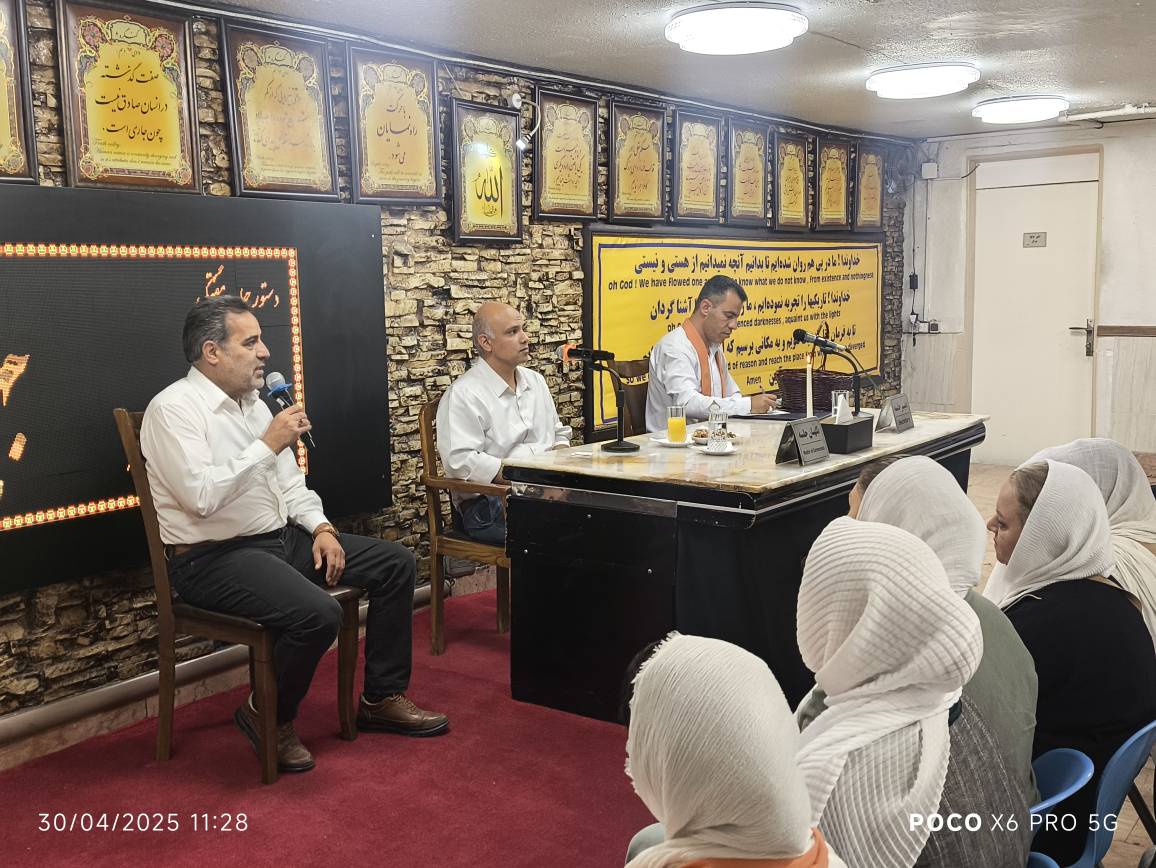
1. The “Second Journey” message will now only be read by the Agent of each branch. In previous messages, it was written that first, if the Congress 60 guardian is present, it would be read by him; if not, and if one of the Didebans is present, they would read it. It was 15 to 20 years ago when the guardian of Congress 60, Mr. Hossein Dezhakam, was always present in all meetings. But now, the guardian is not easily found, and who is going to find him? (laughs) Therefore, these statements are being removed from the written records. From now on, the “Second Journey” message will only be read by the Agent. If the agent is absent, the message will be read by the duty-bound border guard. Guardian, Dideban, and Assistants are also being removed from these writings.
During general meetings, one week, the Agent for travelers will read the message, and the following week, the Agent for companions will do so. It will not always be the case that only Travelers’ agent reads the “Second Journey” Message—there will be alternating turns.
The William White form [the form for being liberated from nicotine addcition] has been revised, and the list of required CDs has been specified. From now on, individuals seeking William's liberation must bring eight CDs with them. The form has changed, and starting from the 10th of Tir, 1404 [July, the first], every William form must list at least 80 CDs.
In the future, all guides including DST, Newcomers, William and Jones’s guides will be selected through the same nationwide exam process. Just as Newcomers’ Guides are chosen via the unified guidance exam, so will others.
The quota of paper will be distributed between travelers and companions. When paper arrives, a portion will be allocated to companions. The percentage of distribution will depend on needs, but generally, it is divided equally. Some may require more than others.
Candidates for interviews must arrive with a complete file—not even a single letter should be missing. Their scores gained from the border guards, and the score gained from their guide, their photographs, and all documents must be complete, or they will be sent back to complete their documents. Furthermore, before any interview, every individual must have fulfilled the Eighth Valley covenant and must have the relevant form with them.
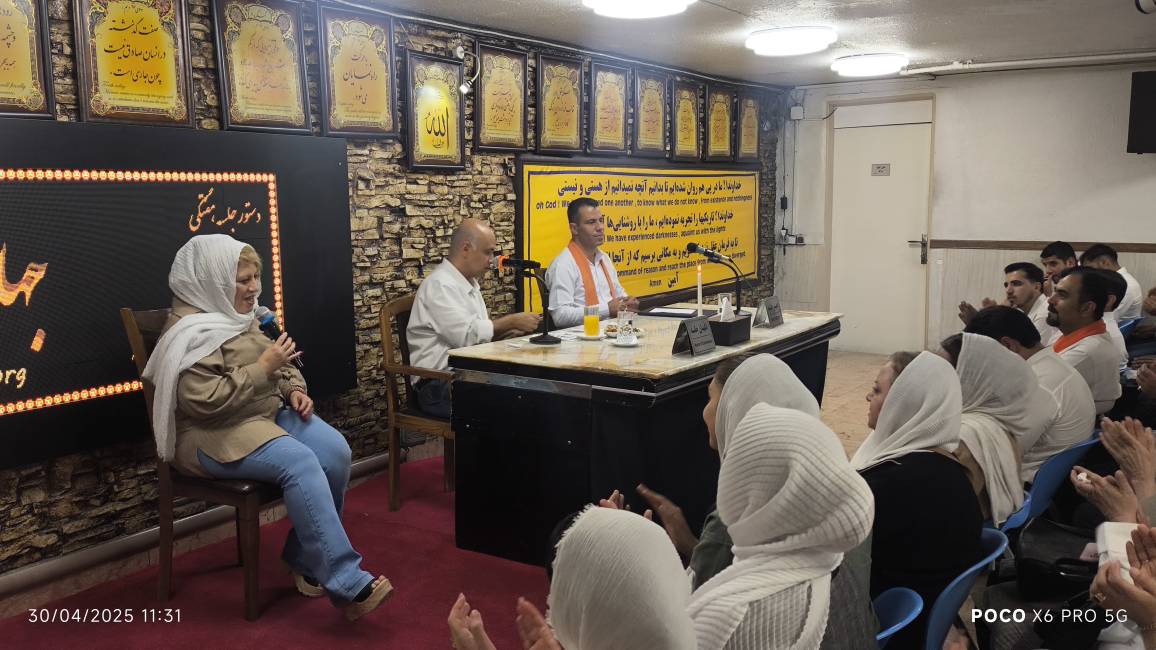
On Monday, the Didebans’ [observers] meeting was held—the first meeting of the Didebans’ in 1404. It took place on Monday, the eighth of Ordibehesht [April, 28], at 2 p.m. in the Simorgh building, with me as the guardian and Mr. Ali Khodami as the secretary.
A pilot plan to establish a legion for guides whose service period has ended will be implemented in select branches. We found that guides completing their four-year term often had no further involvement in branches and could no longer participate in legions. So, we've now decided to create some legions for them. In the companions’ section, we piloted this for female companions, and the results were extremely positive.
Guides whose service has ended will attend meetings and participate in legions exclusively. For now, the agent will serve as the legion guide, and after two to three months, one of the senior guides from that legion will be selected every three months to lead it.
Essentially, these legions will become our “future reserve”—our pool of experienced individuals from which we can select Didebans and assistants. They will be a valuable source of service personnel, agents, and key leaders. Experienced individuals will be chosen from among them for crucial roles.
For now, this program will also be launched in a few men's branches. We will soon announce which region will implement this pilot, and Mr. Majid Salami will specify where [branches] to pilot this procedure in Isfahan.
3. In the men's traveler group, the service period for overseer assistants is set at two years and may be extended for another two-year term. Upon completion, an honorary certificate will be awarded—if their work is satisfactory. Otherwise—well, let’s hope they don’t get kicked out! (laughs)_ That’s just a joke! But seriously, the term used to be 14 months, and now we’ve extended it to two years.
From now on, in the men's traveler group, the term “assistant” will be replaced with “Dideban’s assistant.” The term “assistant” at universities originally meant “assistant to a professor,” and “Dideban assistant” refers to someone assigned to oversee multiple branches.
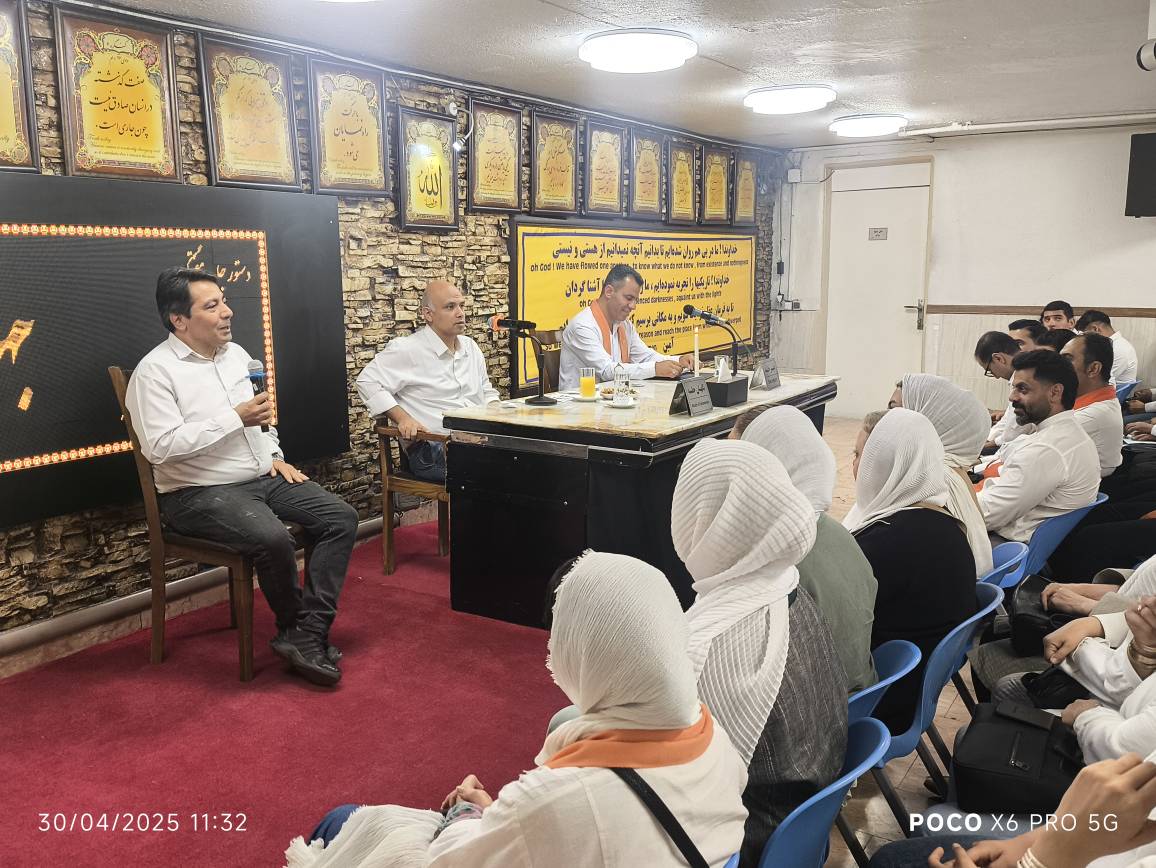
Leadership Appointments and Organizational Updates
With the approval of the Congress of Overseers:
- Mr. Reza Shahmoradi from Isfahan has been appointed as an Dideban assistant under Mr. Ali.
- Mr. Reza Bahrami from the Khorramabad branch has been appointed as an Dideban assistant under Mr. Ahmad Hakimi.
- Mr. Amirhossein Sasani from Isfahan has been appointed as an Dideban assistant under Mr. Majid Salami.
- Mr. Mehdi Mokhtari from the Avicenna Rabat Karim branch has been appointed as an assistant Dideban in the disciplinary legion under Mr. Mohammad Sedaghat.
From now on, any new Congress 60 branch or legion must be discussed in the Didebans’ Council before approval and establishment.
Attendees at the Overseers' Meeting:
The meeting was attended by: Mrs. Ani Kamandar, as well as Mr. Ashkzari, Babak, Mehdi, Ali, Majdian, Reza, Mehdi Sedighi, Mohammad Sadegh, Alireza, Asghar, Ahmad, Majid, and Ali.
Cultural Observations and Challenges in Different Cities
There is a certain level of secrecy embedded in some local cultures. For instance, while cities like Kerman have successfully established six or seven large branches, each with hundreds of members, and Isfahan and Mashhad similarly thrive with branches exceeding 700, 800, even 1,000 members, Tabriz has remained stagnant.
Upon investigating, we found that the issue lies in societal attitudes—people in Tabriz view addiction as highly shameful and avoid discussing it. Unlike other cities where family members encourage each other to seek help, in Tabriz, even brothers refuse to inform their siblings about recovery programs. This reluctance to spread awareness prevents the branch from growing.
However, addiction is not a crime—many have used opium in the past without it being considered illegal. Therefore, I urge people in Tabriz, Ardabil, and surrounding areas to have the courage to share the message of recovery.
Members in Tabriz branch of Congress 60 have to encourage friends and family who are struggling addiction to seek help, or their branches will remain weak, which will ultimately affect their own future—if their own children or grandchildren suffer from addiction, they may have nowhere to turn for treatment.
The next point is the Challenges in Qazvin and Its Women’s Program. We initiated a program for female travelers in Qazvin before establishing one in Karaj, yet Qazvin has struggled to grow. Despite being active for over a year, only 30 women have joined, whereas Karaj and Kerman expanded rapidly. The issue is not the women—it’s the men. Male travelers in Qazvin refuse to allow their female companions to participate, fearing it will damage their reputation.
But let’s be honest—what reputation? (laughs)_ You were once a consumer yourself! What matters now is that everyone—spouses, sisters, mothers—gets the opportunity to recover. I have announced that if the Qazvin women’s program does not gain sufficient participation within six months, we will shut it down and relocate it to a city where it is better received.
This has happened before—when participation was low in Hidaj, we moved the program to Qazvin. If Qazvin continues to struggle, we will move it to another city like Takestan or even Abadan, where people receive Congress 60 well and provide facilities.
Future Adjustments and Ensuring Program Integrity
Additionally, we plan to introduce drug-abuse screening tests for women companions (laughs)—in response to the audience surprise, Mr. Dezhakam asserted, yes, you heard that right. In the near future, individuals wishing to become guides will need to provide proof of sobriety. You may find it amusing now, but soon it will be standard practice.
Many men believe they can “reduce consumption on their own” instead of seeking proper treatment—but experience shows this approach doesn’t work. Therefore, I urge people in Tabriz, Ardabil, and Qazvin to actively spread the message of liberation from addiction, or else their branches will remain weak.
There is absolute safety in female-traveler’s programs—male travelers never interact with female travelers [those females struggling with addiction]. On the days when women’s sessions are held, men do not even enter the building, and no one knows who is in attendance. The female instructors and assistants handle everything, ensuring a secure and private environment.
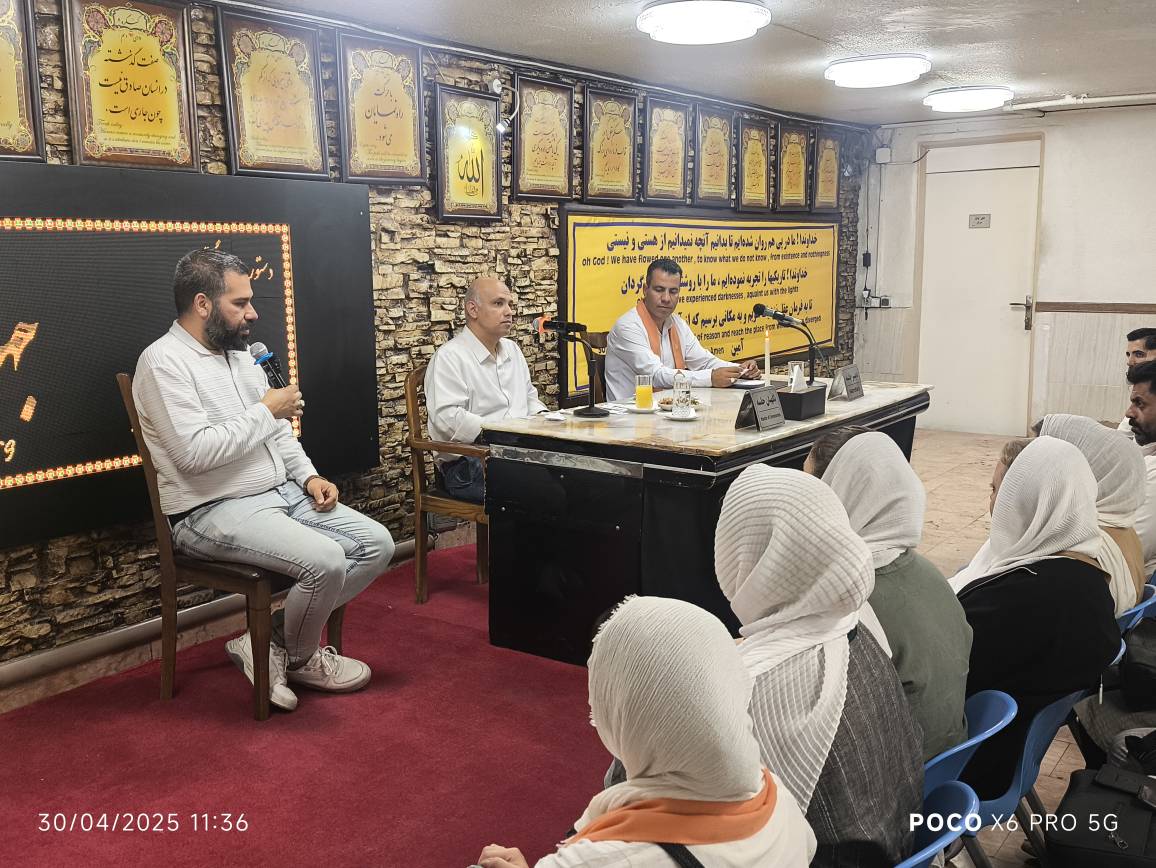
I hope Amin has arrived. Since I needed to provide these explanations personally, I will now hand over the session to him.
Additionally, I plan to form a Physicians’ Legion, and I have been discussing it with Dr. Shadi. The idea is to establish a committee composed of physicians themselves, who will oversee the planning and management. The Taqlani Park Physicians' Group will soon operate independently under their supervision.
I have nothing further to add. I entrust you all to the Almighty and will now leave Congress 60 to attend to other matters.
Mr. Amin Dezhakam takes over the meeting.
Hello, friends. I am Amin, a traveler.
Thank you very much. I hope you are all doing well, healthy, and in good spirits. Mr. Dezhakam unexpectedly instructed me to speak about today's session, and I wasn’t aware that he was leaving so suddenly.
Today's weekly session topic is Worldview Pamphlets 1 & 2—a familiar subject that is part of Congress 60’s educational materials and the foundational principles of worldview. It is an incredibly valuable and beneficial concept, especially for those who genuinely want to understand worldview in depth. This subject is taught in legions, with varying levels of focus—some engage with it intensely, while others approach it more lightly.
For me, Worldview 1 & 2 pamphlets fundamentally transformed my life, shifting me from one world into another. It changed my perspective entirely. I used to be someone closed off, seeing life from a singular, rigid viewpoint. I wanted to analyze, comprehend, and experience everything through pure thought, placing immense pride in my intellect—believing that thinking was the ultimate tool for solving all life’s problems.
Throughout my teenage years and into early adulthood, I dismissed other perspectives. Then, the Worldview pamphlets opened my eyes and taught me that intellectual ability alone cannot resolve every challenge in life—there are countless dimensions to existence beyond logic and reasoning.
Before coming to Congress 60, I had my share of personal experiences—preparing for university entrance exams, dealing with addiction, and then navigating university life itself. Despite my abilities and potential, my actual results were weak and disappointing, to the extent that I lost everything I had built over the past ten years. The Worldview pamphlets was my breakthrough—it saved me from the destructive path I was on.
I vividly remember arriving at Congress 60 and first interacting with members back in 1378 (1999). It took me a year or two to truly connect because I saw myself as better and superior—I thought, “Why should I associate with addicts and substance users? I am far better than them”.
That mindset prevented me from forming relationships, but everything changed when Mr. Hossein Dezhakam established the legions’ system. Once I joined, my struggles intensified. Over time, I realized that challenges, failures, and suffering are fundamental to learning. Hardships are the foundation of growth.
Humans rarely seek solutions unless faced with adversity. If life is smooth—if success, recognition, and happiness flow effortlessly—no one questions their methods of doing everything. If someone approaches a thriving individual and suggests, “Your approach is wrong,” “they will dismiss it entirely, thinking, “Why shall I change? I am succeeding, progressing, and enjoying life! I need not to change.”
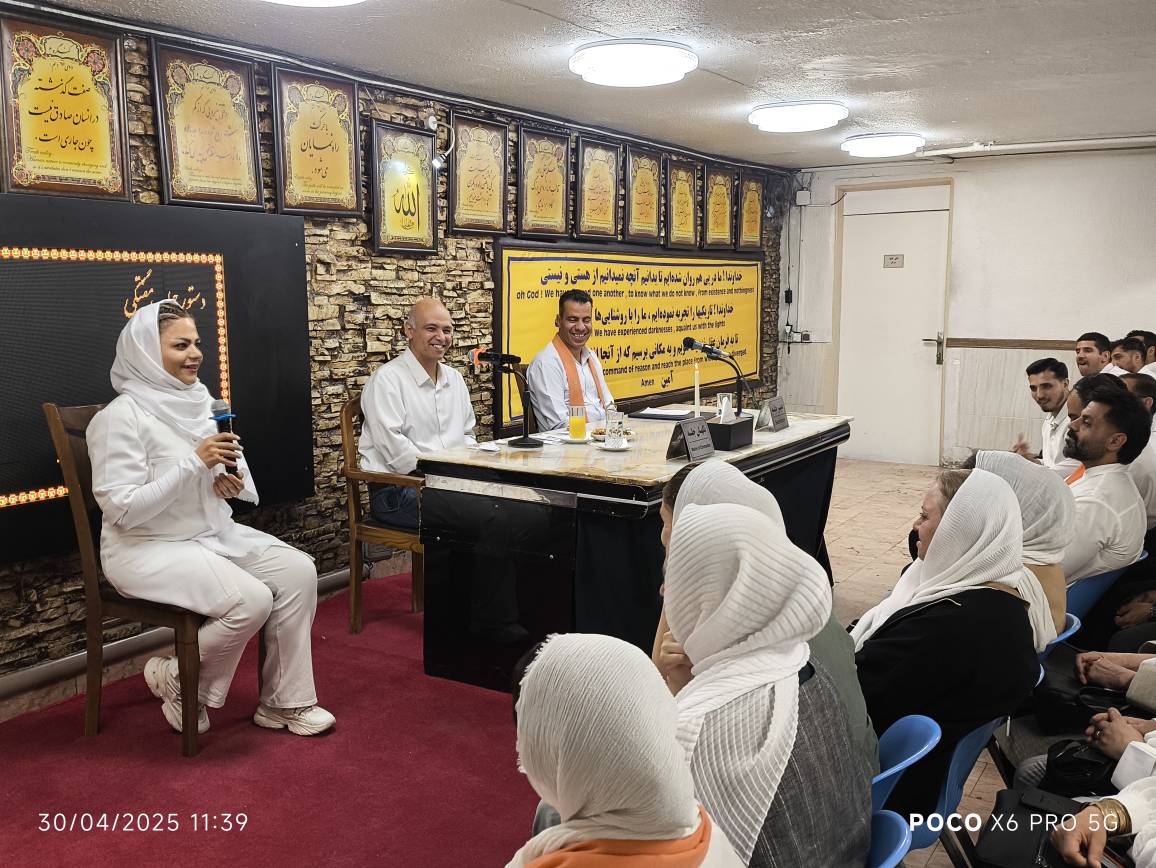
Yet, as Abdullah Ansari beautifully put it: “I never knew that the mother of joy was suffering.”“
Why is suffering necessary? When hardship arises, we seek answers.
Pain forces us to search for mentors. Adversity makes us receptive to guidance.
A person who has suffered will listen [to their mentor]—a person in adversities becomes willing to change, accept new knowledge, and grow. Some grasp the lessons, heal, and move forward. Yet, others forget their pain over time, allowing the cycle to repeat—they learn, recover, regain confidence, and then gradually drift back into darkness. But those who do not forget are the ones who truly progress.
Mr. Hossein Dezhakam once shared the story of Ayaz, a man who rose to become the most esteemed individual after Sultan Mahmoud Ghaznavi. Despite his success, Ayaz maintained a daily ritual—he looked at his old shoes and humble clothes every morning, ensuring he never forgot where he came from.
Pain and hardship are like raw materials—like oil and gas. The more adversity a person has endured, the greater their potential for growing [themselves, their family and society], and the greater their knowledge, and wisdom. However, this depends entirely on how suffering is interpreted—whether it is seen as a crippling obstacle or an opportunity for transformation.
Some struggle for 5, 10, or even 15 years—whether due to financial difficulties, emotional heartbreak, career setbacks, addiction, or health issues. Ultimately, their perspective determines whether they overcome or remain trapped.
Most importantly, once a person escapes hardship, they must never forget their journey. If they do, they will inevitably fall back into struggle.
A while ago, someone asked me, “I can’t enjoy being around people. Why is that?” If he had asked me this question at the time, since I didn’t fully understand the issue, so I had given ten different explanations—none of which truly answered the question. Later, I realized the answer was simple—arrogance.
When a person possesses too much ego, they cannot appreciate others. They unconsciously look down on people, seeing them as inferior. And here’s the problem—when you do not value people, they have nothing to offer you.
When you are arrogant and see others from the top and feels superiority over others, then
- If someone wants to give you food, their hand won’t reach you.
- If someone wants to give you water, their hand won’t reach you.
- If someone wants to teach you something, you won’t hear them—because you are too distant, too high above, too unreachable.
That is the essence of arrogance—it isolates a person from what others can provide. For years, I misunderstood this concept, and even after defining it, it took me a long time to truly comprehend it.
As the saying goes: “I grasped it in my mind, but it took years to reach my heart.”
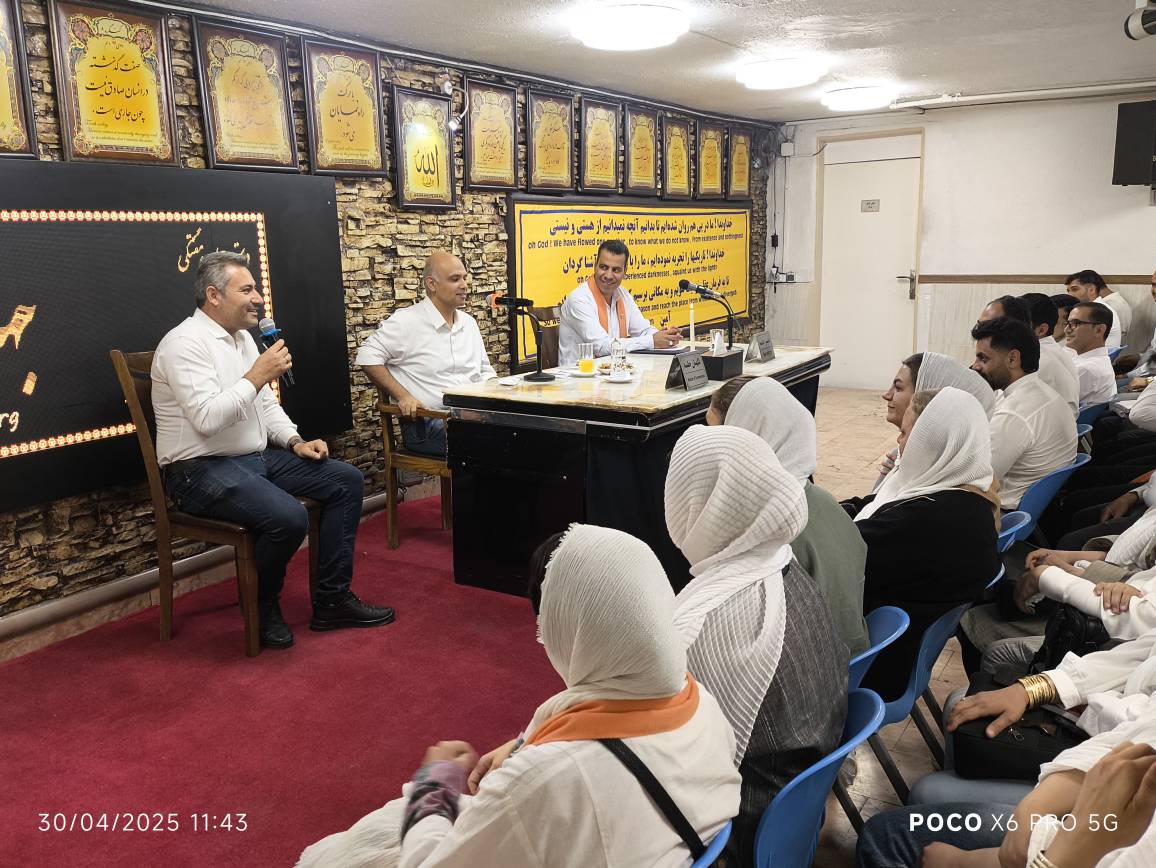
I used to struggle in social gatherings, feeling detached from others—because I had built barriers between myself and people.
True growth begins only when we dismantle those walls.
What You Create in Others, You Create Within Yourself
Whatever energy you instill in others ultimately manifests within yourself.
A person driven by arrogance seeks to maintain their status. They want to be seen as powerful, intimidating, and exceptional—someone others respect out of fear, not admiration. To preserve this position, they must create an atmosphere of authority, ensuring that others regard them with reverence and trepidation. So, what must they project to achieve this? Fear.
They must instill intimidation, unease, and dominance in others to be considered intimidating. But here’s the paradox—the fear they create in others eventually takes root within themselves. It's almost like a trick—the moment someone spreads fear to maintain their arrogance, they become consumed by the same fear.
Conversely, when someone cultivates comfort, warmth, and security in others, these emotions reflect back onto themselves. A guide who fosters fear and anxiety in their followers will eventually internalize the same turmoil.
For example, imagine a teacher who instills dread in their students—making their hearts race at 180 beats per minute in nervous anticipation of their presence. This fear eventually returns to the teacher. But take another type of teacher—one who radiates joy and kindness. When people light up upon seeing them, their own being fills with happiness.
I personally experienced this while teaching music. For a year and a half, I was extremely critical of my students—constantly pointing out errors, demanding precision, and urging them to stay concentrated.
However, when I picked up my own instrument to play, I kept making mistakes—stumbling, faltering. I asked myself: “Why is this happening?”“
Then I realized—I had projected pressure onto my students, and now, that same pressure was manifesting in me. What I created in them, I created in myself.
These concepts are taught in the Worldview. I have now realized that joy in life and in social interactions only emerges when arrogance steps aside. This does not mean a person lacks identity or self-worth—it means recognizing oneself as part of the whole.
Human beings are not equal in knowledge, morality, or virtue—but they are equal in their humanity. At our core, there is no difference—if someone sees themselves as fundamentally superior, they will create a separation between themselves and others. When I went to Shiraz University, I could have chosen to rent my own luxurious apartment—I had the means and the opportunity. But instead, I opted for the dormitory. Interestingly, Ebrahim was with me, and we moved in together.
The Shiraz University dormitory was in terrible shape—previous residents had wrecked the place. When we opened the door, Ebrahim looked at me, and I looked at him. He laughed and said, “Professor, this place is beneath your position!” _(laughs)_
For a moment, I believed him—he was right, it was in horrible condition. A cramped 18-square-meter room, filled with beds and belongings. But as time passed, I told myself: “No—this is exactly where I belong.”
I had to choose—live in a well-furnished private apartment or stay in the dormitory. The house was more comfortable, yet the dormitory came with neighbors, roommates, and friendships—one person living next door, two roommates inside, neighbors across the hall, and even the familiar faces outside. Two friends whose name was Javad, one living across the hall and the other living in the front room.
That experience shaped my life. At the time, I had avoided military service, but in a way, the dormitory was the same as the military service. Without those people, I would have been expelled from Shiraz University within two years—without a doubt. If I had chosen the private house, I would have failed completely—unless a miracle happened. It was those people who taught me, guided me, and helped me create a new life and a new perspective.
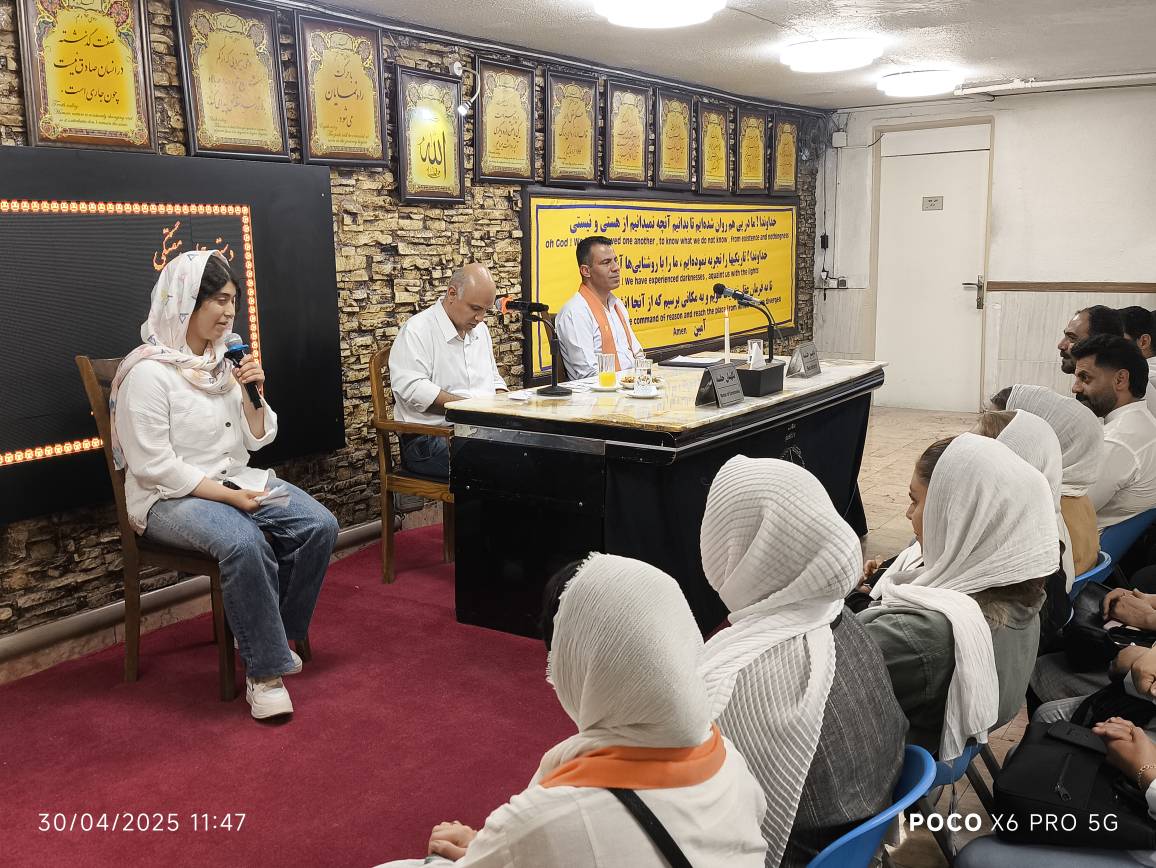
However, arrogance was still within me—I was a teacher of Worldview [in Congress 60], after all. Yet there I was—living in a 14-square-meter room, splitting space with others, sleeping in confined quarters. Could I have avoided this discomfort? Of course, yes. But without these experiences, joy of life would have been lost—many events happened to me at that time, I have now missed that dormitory, and my friends there.
Later, when we attended the first Congress 60 camp, we had to choose either a villa (owned by one of Congress 60 members) or a tent, one was like the heaven, the other a hell. The villa was luxurious—warm by the fireplace, watching movies, playing video games, relaxing effortlessly. The tent was rugged—freezing cold, damp floors, no proper bathrooms, and the unpredictability of animals like cows coming to our tent.
We chose the tent. Among us were Mr. Torabkhani, Mr. Khodami, Mr. Majdian, Mr. Hakimi, and several others from Congress. We had two tents, each housing seven people. We slept crammed together, on one side of our body, sometimes stacked like two layers of bodies. If anyone needed to leave for the bathroom, they had to step over everyone else, waking the entire tent in the process _(laughs)_.
Could we sleep in peace? Not at all. But that experience evolved and became something greater.
Defining arrogance is one thing—applying that understanding in life is another. The real challenge lies in making the right choices at key moments and putting that knowledge into practice.
We often study definitions:
- Fear is defined as this.
- Despair is defined as that.
- Grief is the weight of sorrow that cannot be carried, yet cannot be set down or ignored.
But understanding these definitions intellectually is not enough—what matters is how we apply them in decision making moments. The Worldview pamphlets doesn’t just provide concepts—it creates a belief in us that there is a deeper knowledge, something embedded within ourselves.
The starting point of Worldview is this:
“Everything you see in the external world also exists within you. The only difference is that you must search and discover it within yourself.”
That insight was a major breakthrough for me. Additionally, I realized that pure thought alone cannot solve all problems. Thinking is not an absolute power—one must gain experience, seek education, and embrace mentorship. I had to be a student, to learn, listen, and obey—not a blind submission, but a genuine acceptance. Saying “Yes” doesn't mean nodding along while secretly doing your own thing—it means truly following guidance.
I struggled with this rule—I used to think, “I understand things better. I have strong analytical skills. Why should I listen to others?” I even criticized Mr. Hossein Dezhakam, saying, “your doing is wrong. That approach isn’t ideal.” “ I didn’t realize how much I didn’t understand.
Real learning comes through experience. You must endure difficulties. You must pass through suffering. You must face challenges to understand them fully. Many people try to erase hardship from their lives—to keep everything perfectly under control. Some in Congress 60 want ideal conditions: they want everything to be under their control, their house must always be perfectly tidy, if a single speck of dust lands on a table, everything feels ruined.
But what does this mean? They want to fix and control everything—to eliminate all variables, this ends in destruction.
When you want to fix everything and have everything under your control, no changes take place in your sensation. If that change does not happen for you, you will never accept to experience a slight chill.
- your home must stay at exactly 24°C.
- If it’s a little warm, you panic: “I’m dying! Turn up the AC!”
- If the sun shines, you rush for shade and sunscreen.
- If it’s cold, you demand scarves and coats immediately. If everything remains fixed, life loses its richness—it becomes dull.
I remember when I traveled to the equator, and I was shocked—the fruit had no flavor. Why? Because there’s almost no temperature fluctuation throughout the year—the difference is barely five degrees. The skies remain cloudy, the humidity and temperature are constant, and there is little direct sunlight.
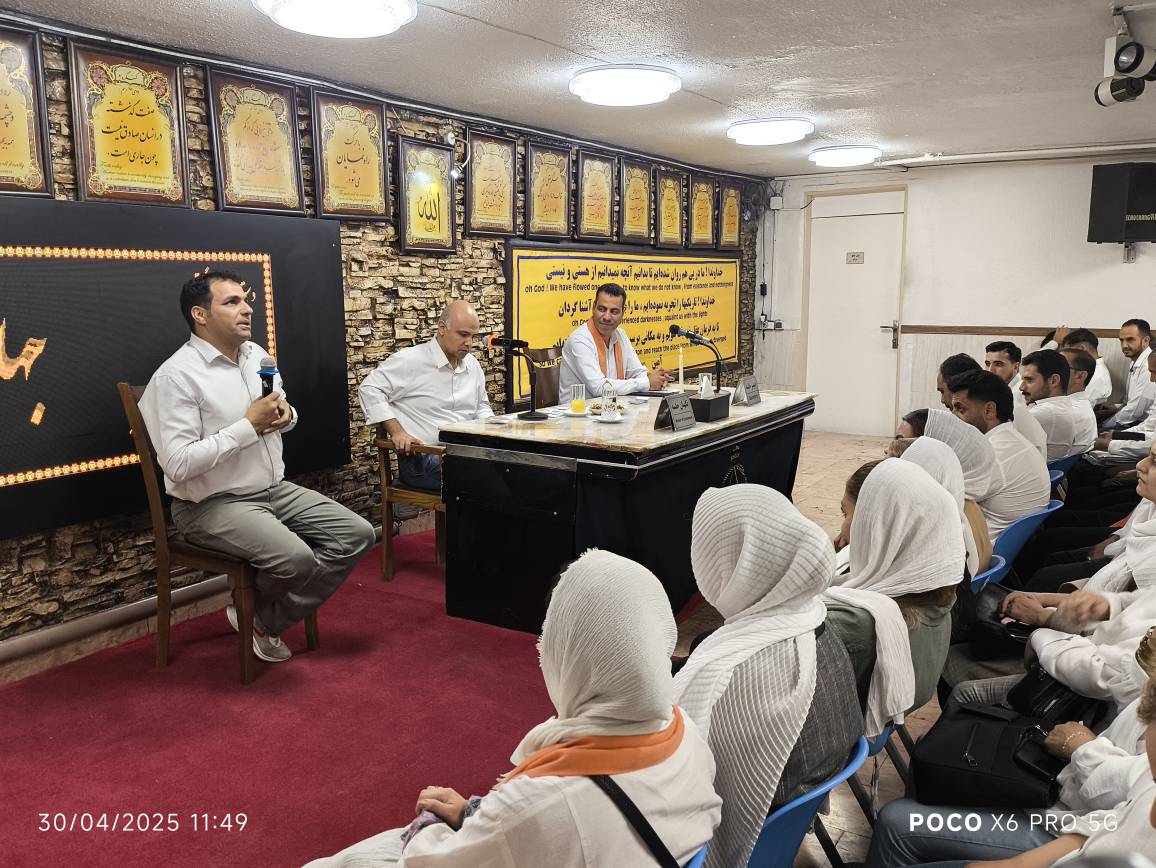
Eating fruit there was like drinking sugar water—everything tasted flat. But in Iran, when you bite into a peach, your eyes widen in delight because it’s bursting with flavor. When you eat watermelon, or mulberries, your eyes twitch and your mouth waters, because they are too delicious to imagine, and each fruit has its own unique taste, its own intensity. Why does each fruit have a unique taste? Why do the berries are so sweet and tasteful? Because Iran’s climate is full of variations—in Hidej, the difference between summer and winter can reach 70°C.
Even in a single day, the temperature can change by 20°C.
Across Iran you can find different type of situations: Sunlight, Shade, Clouds, Dry air, Extreme humidity. These fluctuations in temperature means [experiencing] different senses—some say Iranians are intelligent, this is true but not because of having innate superiority, but because they have different climate.
Every region of Iran has a unique climate—Gilan is distinct, Mazandaran is different, Azarbaijan has its own characteristics, and Sistan-Baluchestan has another entirely. Almost 80-90% of the world’s climate types exist within Iran. This is why Iran's cuisine is unparalleled, why its people display incredible diversity, and why talent and creativity flourish.
Unlike some countries where landscapes remain unchanged for thousands of kilometers, Iran offers endless variation. You travel three kilometers from Tehran, and suddenly, you're in a desert. You go 20 kilometers further, and find yourself in a lush alpine region. Few places in the world have such dynamic contrasts.
Many countries do not have the blessings of change and variation that we do. These fluctuations—whether in climate, experience, or sensation—are what allow transformation to happen. Therefore, if a person understands this, they will not deprive themselves of experience. They will not sit passively at home, glued to their phone from morning till night. Instead, they will engage in varied activities, embracing different sensations and experiences—allowing new forces [energies] to emerge within them.
A person who truly grasps this concept no longer seeks to control every aspect of their environment. They stop insisting that everything must be predictable and uniform—because that is exactly what negative forces desire. Negative forces want you to stop experiencing new sensations. Because without new experiences, understanding cannot develop. Without movement, talents and abilities cannot form. Without change, a person becomes weak and one-dimensional.
I’ve spoken about this before, but now let’s explore the deeper aspect of this: Stillness vs. Movement. Stillness is the desire of darkness and restraining forces. Movement is aligned with creation and the universe. Nothing in nature remains completely still—everything is in motion.
Take a swamp, for example.
- What kinds of creatures thrive in stagnation?
- What kinds of creatures inhabit a murky, unmoving bog?
A flowing river, on the other hand, is full of life and renewal. In stagnant waters, danger lurks—you wouldn’t dare step into a swamp. Even if there were no crocodiles, a single mosquito bite could send you to the hospital for weeks. Because wherever there is stagnation, there is decay. Conversely, where there is movement, there is evolution. The universe, existence, and creation itself do not operate in stillness—everything is in motion.
But negative forces seek to disrupt this natural order—they try to impose stagnation. They create inertia—because in Hidden Aspects, they can turn the swamp into a breeding ground for destruction.
A person who never moves forward becomes a nest for negative forces. They come home from work and sit in front of the TV for six hours—they become stagnant. They spend 6-8 hours mindlessly scrolling on their phone—they become a swamp. They don’t even realize the transformation happening within them. Using the phone for an hour or two, engaging in conversations, watching informative content—that’s fine.
But six hours of mindless engagement turns a person into a stagnant pool—the perfect condition for restraining forces to take hold. Negative forces create stagnation, while divine forces drive movement. And movement brings the most breathtaking sights:
- Mountains.
- Rivers.
- Flowing currents.
- Winds that shape landscapes.
- Clouds that form and dissipate.
- Rainfall created by the movement of air.
If the wind did not blow, the rain would not fall—nothing would change or progress. Negative forces seek stagnation—they thrive where there is no movement, where life remains static. When there is no change, no motion, they settle into the body, finding a place where there is no resistance or renewal.
You can see this in certain people—ask them to get up from where they’re sitting, and they react with irritation, as if moving is a burden for them. Even slight movement feels like effort, and if you try to nudge them to move, they push back—resisting any disruption to their stillness.
The following philosophy connects to a deeper truth about hardship: If a person avoids effort and movement, they unconsciously draw closer to darkness—whether they intend to or not. Negative energies begin to take root, growing within them. This process is so subtle that the person doesn’t even realize what is happening. Over time, stagnation manifests in illness, mental distress, or negative thoughts—it seeps into their existence, making them weaker. This is why many divine laws carry specific disciplines or consequences—even if, at first glance, they seem harsh or difficult to comprehend.
Take punishment in religious texts—someone commits rape or theft, violates trust, or disrespects sacred values. The prescribed penalties may seem extreme at first, but they serve a deeper purpose.
When a person moves toward darkness, when their spirit stagnates, negative forces embed themselves within them—they make a home within the person’s being. Whether it’s theft, dishonor, or other transgressions, the punishment serves to expel that darkness.
- A beating, a struggle, a hardship—all of these punishments force negative forces to retreat. Fasting for 60 days as a punishment for wrong doing, for example, creates discomfort—pushing out stagnant energy. The pain or discipline causes these tasks forces to gather their things and leave the body, realizing that their place is no longer there.
Without such discipline—without fasting, hardship, or struggle—the darkness remains, the stagnation lingers, and the person does not change. This applies to raising children as well. If parents only provide comfort, shielding their children from every challenge, they unknowingly serve the desires of negative forces.
If they do not perform the requirements [like fasting for 60 days], the negative forces will remain in their body. The same applies to children, the children who are not hardworking, those who do not try, [are the prey for Satan]. Just remember, Negative Forces seek servants—and remember that positive forces do their own tasks; however, negative forces seek people doing their duties, the negative forces want someone to dress them, feed them, cook for them or drive them. Of course, some individuals have positions of responsibility, requiring assistance from others. That’s not the issue here—the issue arises when comfort becomes a lifestyle rather than a necessity. The negative forces want to be constantly served.
If you raise children with nothing but ease, you unknowingly empower the negative forces within them.
- “My child shouldn't stand in line at the bakery.”
- “My son shouldn't do manual chores.”
What’s really happening? You are serving the forces that weaken them.
If you want to examine the accuracy of my words, just try challenging them, and watch how they resist—how they try to overpower you. You can ask a pampered child to do something, and see how they fight against you.
And you serve them so that they focus solely on their success, thinking that shielding them from real-world struggles will lead them to “break through the future”, it won’t work. Instead of building strong individuals, in this way, you create warriors who will soon fight you and destroy you.
You are only giving that power to their jinn [the negative forces within them]—you are raising and training gladiators. When you merely ask them to study at home, without washing dishes, when ask them not to do anything at home to help their father or mother or the family, when you ask them to just focus on their studies, they will be gladiators. When breakfast is brought to them, when the parents bow to their children [become their servant], spoiling them, asking ‘Are you eating ice cream, dear?’ ‘What would you like me to cook now? Do you want lasagna or pizza? If you don’t, should I get you a hamburger?’ ‘When shall we take you out?’ ‘Do you have time to go for a walk? Will you honor us by spending an afternoon outside?’
You parents, just pack up this mess—this is not right. The first person who is bitten by the same child is the parents. These children against their parents, meaning you have given it all the means, but you have not taught them life lessons. The teachers of boys are their fathers, and the teachers of girls are their mothers. This is what God has promised them, and these rules must be fulfilled.
A father must pass down the knowledge and experiences he has gained throughout life—teaching his son how to become a responsible man, how to lead a family, how to earn a living, how to choose a spouse, how to manage a household, how to buy a car, how to pay expenses, whether he is a laborer, a professor, etc. Likewise, a mother must teach her children how she brought them into the world, how she managed the household, how she prepared meals, how she organized daily necessities. Parents must actively train their children rather than simply providing comfort.
A son should from his young age must go to work with his father, learning the value of effort. When I was seven years old, my father, was a CEO, the highest ranking executive. When I told him I wanted to work, he agreed. During summer vacations, I went to work. He told me, “You’re a child—others work eight hours, but you can work four.” My job was simple but meaningful: mopping the floors, sweeping the workstations, wiping the tables. There was no special treatment—not even for the boss’s son. No one pampered me, no one brought me corn snacks, no one treated me like royalty. I worked just like everyone else, and at 2 p.m., my uncle picked me up and took me home. That was my training for one or two months every year until I became more confident and resilient.
The result of working at childhood was that I gained confidence and courage and when I was in middle school, I was selling cables and pictures at school. I had no fear of stepping up because in childhood, I had already learned the importance of effort. Every summer, I worked in my father’s company, and it was the best time of my life. I learned so much, and even when I was in the third year of middle school, my father entrusted me with a key to open the company at 6 a.m. That year, we worked on creating electric fuses—ones that my father had invented himself. The foreign model cost 100 tomans, but Mr. Hossein Dezhakam had created an Iranian version, that was only 10 tomans. In 1370 (1991), he received an order for 10,000 fuses—earning one million tomans in total, while an employee’s monthly salary was only 5,000–7,000 tomans. For one month, my cousin and I worked from 6 a.m. to 6 p.m. assembling fuses. The pay was based on output: for every fuse we assembled, we earned one toman, each fuse cost 10 tomans and for each fuse we fixed, we got one toman. Mr. Dezhakam gave us that lesson and it was effective.
Fathers and mothers must teach their children, they have to teach their children whatever they have learned. When a son works alongside his father, he learns the true value of life. It reminds me of the story of the father testing his son’s understanding of work. The father urged his son to work, but the mother felt sympathetic—so instead of letting him work, she secretly gave him a coin each day, telling him to pretend he had worked. The son handed the money to his father, saying, “I earned this.” But the father knew—his son had never truly worked. So, he threw the coin into the fireplace. The boy watched it burn, unfazed. One day, the father instructed the mother not to give him money—forcing the boy to actually work for his earnings. When the boy finally earned a coin on his own, the father threw it into the fire again. But this time—the boy jumped into the flames to retrieve it, burning his hand in the process. His reaction proved the truth: This time, the boy had truly worked to gain the coin.” Through hard work, the boy had learned the true value of effort. This real hard-working will secure the body against the negative forces.
That physical labor and hard working secures the body. A child who only studies and never engages in real-world tasks to outperform all peers becomes one-dimensional—like the Milad Tower with other abilities and appeal. They might excel in one narrow skill, but they lack emotional depth. If they experience cooking, household chores, or physical labor, they appreciate their parents’ efforts. A son who works alongside his father witnesses the struggles of supporting a family—he understands the sacrifices made to maintain stability. This awareness fosters sense in them leading to a balanced person. On the other hand, if a child is shielded from all challenges, pampered, and served without effort, they become entitled and disconnected from life’s realities. That is why in sacred teachings of the holy Quran, it is said: “By the father and mother—I swear upon them.” It signifies that a child’s soul is shaped by these three figures.
You can understand how to raise and train your children from the book “Crossing the Zone 60 Degrees below Zero”. In this book, it is mentioned that children must be educated holistically—in academics, in music, in moral character, in the holy Quran. They must learn to be respectful, to appreciate others, and to engage in society. A person who lacks social experience, who only receives service, they are not sociable. I once had a student—a childhood friend’s daughter. I taught her for free, offering 20 private lessons to help her succeed. Yet, when she passed her university entrance exam, she didn’t even express gratitude—not a single word of thanks. That was my mistake—I should have charged her twice the normal rate. Why? Because she had never learned appreciation. It was not her fault—it was how she had been raised, without an understanding of respect and gratitude.
An unhealthy competition exists where children are pressured into a rigid academic path. First, universities are no longer crowded. The entrance exams are not what they used to be. Yet, there is still this illusion being pushed—that kids must focus solely on studying. But what happens if a child doesn’t get in the first year? They can try again. If not the second year, maybe the third. And even if they never enter university, they should pursue what truly interests them. What matters is the outcome. Even if these pampered children become engineer, thy won’t be good engineers, in my perspective. Would you rather have a top engineer from a prestigious university who destroys their own life? Or a simple laborer who builds a prosperous future? Which one is better—a proud surgeon who dismisses everyone with arrogance, ruining lives in the process? Or a humble worker who finds true happiness? This is worldview. This is arrogance. You learn to overcome arrogance when you stop forcing your child to be the best. The moment you accept that they don’t need to win at everything, you begin to understand the worldview. This understanding is a new experience. The experience of living among people, shared laughter at meals, conversations that bring joy. This is far better than isolating oneself in studies, eating alone, and burying oneself in books. Instead of studying continuously, children must learn to come and eat dinner for 20 minutes with their family members, or iron the clothes with their mother, or help their father in washing the car. If we raise our children this way, they won’t be one-dimensional gladiator.
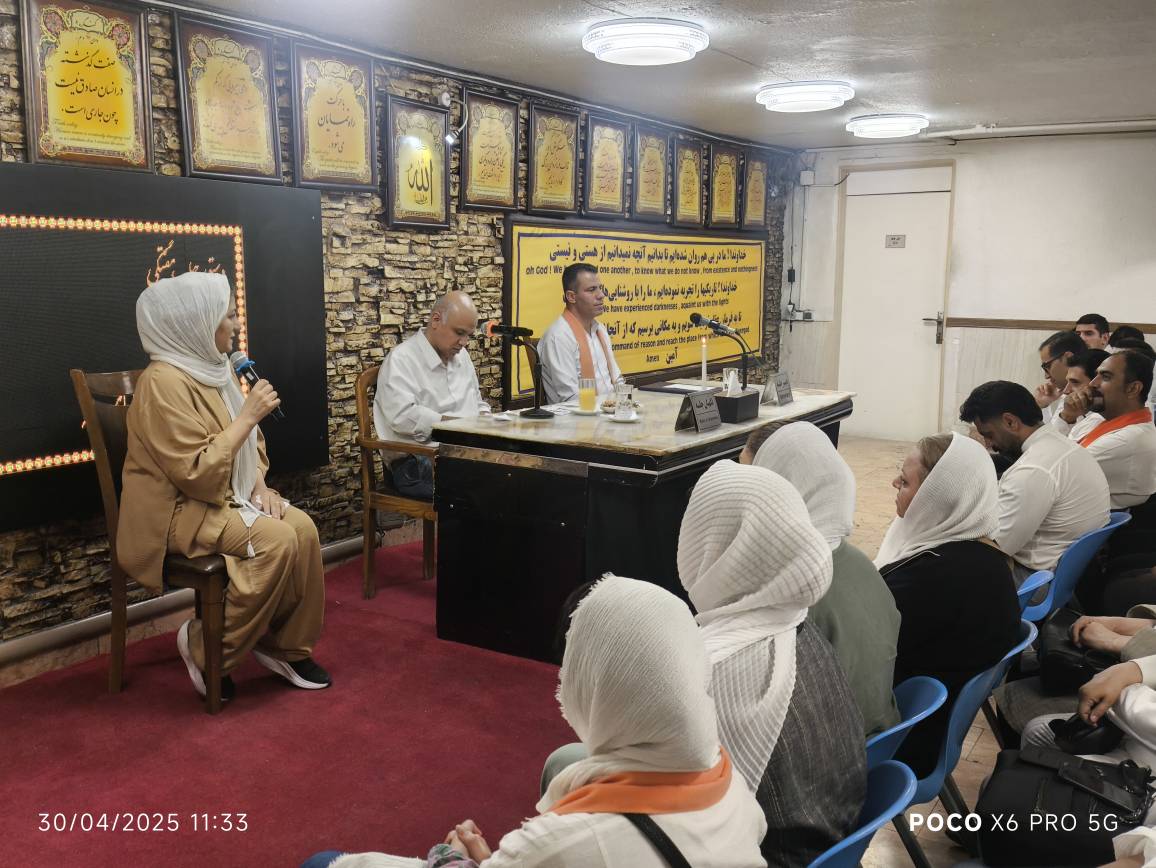
Motivational workshops often demand extreme discipline, like for true strength in life’s battles, you must cultivate resilience, you must study ten hours a day!—but that isn’t realistic. Some people struggle to focus for even ten minutes. After years of chasing this rigid system, many end up mentally retarded individuals. Once, my young cousin said, “In our institute, we have a genius.” He was completely absorbed in his studies, barely reacted to anything—sometimes laughing unpredictably, sometimes zoned out. He had aced all the tests and secured admission to Sharif University. I told my cousin, “He is not genius. We call it insanity.” However, recently, they are called genius, with thick eyeglasses, and strange clothing and hat and say nonsense. However, a genius is someone like Mr. Hossein Dezhakam or a person who invents vaccines or solves real-world problems. If a person is unidimensional, at best they will be a successful insane person. However, if you learn worldview which means the science of living, learning how to live among people, how to speak with your parents, compromising when necessary, this means knowing worldview or the science of living.
I remember a camping of Congress 60, where Mr. Ali Khoddami, a Dideban of Congress 60, had an important personal work to do in the last day of camping, he asked me, “May I leave a day early?” I told him, “You decide—you are free to go. But if you leave, I will struggle with the workload. It will make things harder for me, I will get sad. He replied, “Then I won’t leave, I plan my work in other ways, so that I can stay here.” If he were a unidimensional person, he would say I must go, a person who does not know worldview would say: “No, I must leave. My goal is more important.” However, Mr. Khoddami chose to stay, helped immensely, and carried out the tasks exceptionally well.
A person who knows worldview knows that they must make sacrifices, during final exams, such a person might spend ten minutes tutoring a struggling friend, thinking, “It’s okay if I lose a little study time.” Or when a friend is sick, they might prioritize buying medicine over their own schedule, a person who can help in such situations, has learned worldview, knowing worldview is knowing the science of life, this person will be successful and reach deliverance.
We must also learn not to turn friends into enemies. The lessons I learned in my Ph.D. program still stay with me. I once had conflicts with two professors. During an exam, the professor stepped outside, and immediately, students pulled out phones and notes, collaborating openly. I sat, frustrated, watching this—my mind clouded with anger. I had prepared, yet my focus was breaking. When results came, my classmates scored 16 or 17, while I landed at 12. I had failed the course. I later wrote to the professor, saying, “Everyone cheated.” He replied with sarcasm, “Now you complain, after getting a low score?” I carried resentment for weeks, plotting how to strike back, feeling my rights had been violated. But in the end, I sent him an email, saying, “I should have spoken up earlier. You were right. I apologize.” And just like that, it was over.
I had another professor whom I struggled with, and when it came time for the midterm exam, another professor made me focus on a project instead of allowing me to study properly. As a result, I scored 3 out of 20—while the top students had scores of 16, 15, 14, and 13, and I was the fifth in line with only 3. I went to him and said, “Professor, I scored 3. If this grade is averaged into my final exam, I’m finished—my GPA will drop below 16, and I'll have serious problems. If you're going to average it, tell me now so I can drop the course.” He assured me he'd reduce the impact of the grade. I told him, “If you only reduce the impact, it still won’t help me—I either need you to remove it, or I’ll drop the course myself.” He then promised, “If you score 17 or 18 on the final, I’ll drop the midterm grade.” We agreed.
I studied hard and gave my seminar—I scored 19. But instead of removing the 3, he averaged it in (laughs). Coincidentally, at that time, my mom, Mrs. Ani was hospitalized and in poor health. When I saw my final grade, it was 15, and my GPA dropped below 16. I emailed the professor, but he never replied. Three days later, he submitted the final grades. I confronted him, asking, “Professor, what happened?” He simply said, “I forgot the promise and already submitted the grades, I cannot change your score now.” I asked, “What do I do now?” He casually responded, “Go ask someone else for a grade.” I knew there was no chance—the other professor wouldn't even give his father a grade. At least this one had given me hope, but he had failed to keep his promise, claiming he forgot. That event made me resent him.
For a while, I kept wondering how to get back at him, how to make him realize what he did. But I held back—I told myself, “You're not in the right mindset. Wait.” Days passed, and when I encountered him in the department, I simply greeted him respectfully and moved on. I did that twice—acknowledging him and letting it go. Over time, my anger subsided.
Then came my comprehensive university exam—just six days away. Mrs. Ani was still sick, and the circumstances were difficult. On Wednesday night, I arrived at my university dormitory, and I sought advice from a friend who had completed his master's degree at Sharif University. He asked what I had studied, when I explained, he said, now you say farewell to the comprehensive exam, because whatever you have read is useless and you will fail the exam. He made me sure that I will fail the exam.
This moment triggered my arrogance. I thought, “Who do you think you are? How do you know I’ll fail?” I wanted to challenge him—to prove him wrong. Instead of reacting negatively, I decided to switch strategies. I went back to him and said, “Javad, you've already passed the exam. I'm taking the exam for the first time, so I need your help. Be my coach.” He was completely caught off guard—he had expected an argument, not a request for mentorship. He hesitated, then finally agreed. He gave me my first task, saying, “Go to Mojtaba—he has some questions. Get them, solve them, and bring them back.” Without hesitation, I slipped on my slippers and rushed off. He asked, “Where are you going?” I simply answered, “To get the questions.”
I found Mojtaba, got the questions from Mr. Koufi’s locker, thanked him, and went straight to the library at 10 p.m, studying until 1 or 2 a.m. I solved as many as I could and returned the next day. Javad continued guiding me through the next steps. Each time I attempted an exam, he reviewed my answers and gave feedback.
The first exam? Borderline passing. The second? Slightly better—but still on the borderline. The third? Much stronger—he finally told me, “I think you have done it, you will pass the exam.” When the final comprehensive exam results came out, I passed on my first attempt. I went back to Javad and thanked him, saying, “Your guidance helped me pass on my first try.”
Each year, only one or two people pass on their first attempt—both in written and oral exams. It wasn't because I was exceptionally good; it was because I made a choice, a choice that could have led to hostility. But the same person who initially challenged me ultimately helped me succeed in the comprehensive exam. In that moment, I had to set aside my arrogance and pride. I approached someone skilled and asked them to teach me, and they did.
However, I faced difficulties with my supervisor, who eventually expelled me, saying they couldn’t work with me. I was deeply upset, but I sought guidance from the same professors involved in the exam controversy—the ones who had withheld my midterm grades. Surprisingly, both of them accepted me as a student and supported me when I needed help the most.
Had I retaliated, my former professor would have struck back, and others might have followed suit. This is the essence of worldview—understanding the significance of choices. It took me a long time to truly grasp this. I had studied these concepts, but I hadn't fully applied them in practice. It wasn’t until I faced this challenge that I learned firsthand.
Arrogance isn't about memorizing definitions and explaining them to others. You truly understand it when you can transform enmity into friendship. When you fail, fall, and manage to rise again—when you step out of that room despite the setbacks in your journey, that is when real learning happens. If your plans collapse, and you humbly admit your mistakes to your guide, expressing your truth without concealing your failures, that’s when you begin to understand the depth of worldview.
Sitting in a Congress 60 session, disregarding what others might think, focusing instead on your own growth—that is when you truly grasp it. And when your instructor asks you to do something, you simply say "yes" and follow through without adding your own modifications—that is how genuine education works. Practical worldview is built upon these principles.
These lessons changed my life. 20 years ago, writing this pamphlet saved me from expulsion from the University of Science and Industry years ago, and twenty years later, they prevented my dismissal from Shiraz University. Time and again, worldview has intervened, pulling me back from the edge. I hope it serves the same purpose for you.
There were other lessons as well, but in summary, principles must be applied. Children should not be raised with a one-dimensional education. As the book “Crossing the Zone of 60 Degrees below Zero” teaches, science, art, and divine teachings of the holy Quran must all be imparted. Children should learn an artistic discipline, excel in science, and grasp the essence of worldview. They should learn service from their parents, and life lessons from them too. Parents must not exchange their role as mentors for that of servants; they must reclaim their rightful position because their children's future depends on it.
While jinn (negative forces) seeks comfort, the soul is forged through effort and movement. Keeping this in mind allows us to live balanced lives and truly experience life. We are all constantly learning at different levels, and I hope you find these insights useful. I have spoken at length—thank you for listening.
Translated by Elahe, Sheikhbahaei branch of Congress 60, Isfahan, Iran
